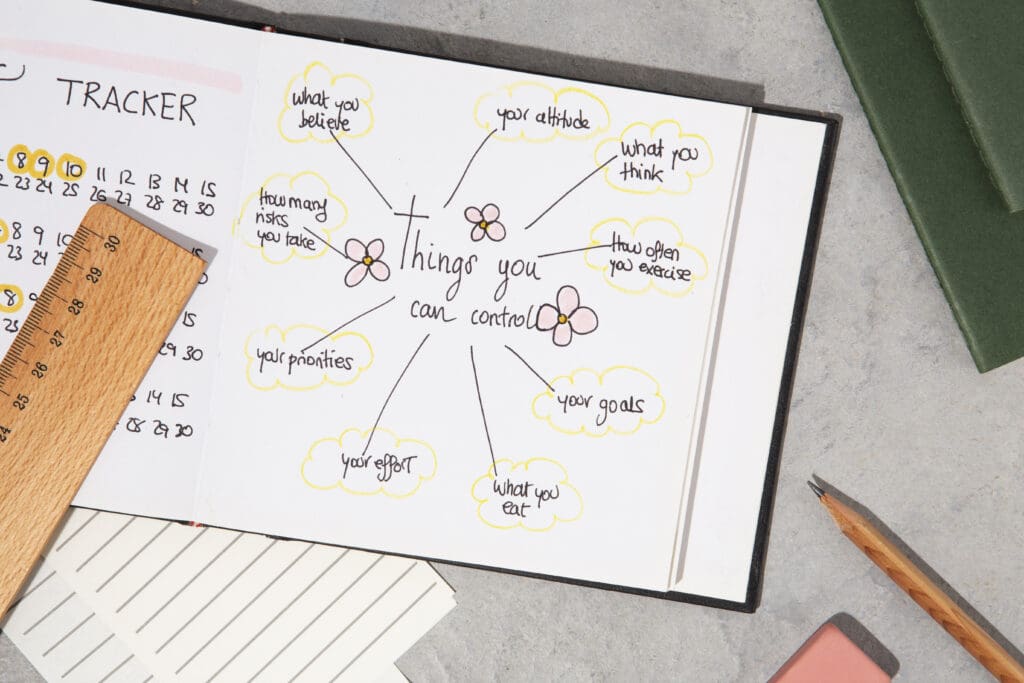
Premenstrual Syndrome (PMS): Practical Tips for Managing Symptoms with Ease
Premenstrual Syndrome (PMS) is something many of us have heard of. But it’s often misunderstood or reduced to just “mood swings” or “feeling a bit down”. In fact, for over 80% of women, the days leading up to their period – the luteal phase – can be stark enough to disrupt daily life. Whether it’s headaches, irritability, or difficulty sleeping, these symptoms are tied to hormonal changes that range from mild to severe.
What is PMS?
PMS refers to recurring emotional, physical, and behavioural changes. The exact causes remain unknown, but hormonal fluctuations, and lifestyle factors like diet, exercise and stress can influence the intensity of symptoms. In this blog, we explore practical ways to manage PMS to support you during this uncertain time.
What are common PMS symptoms?
PMS symptoms can fluctuate from one cycle to the next. No two people will experience it the same way. However, some of the most common symptoms include:
- Headaches
- Nausea
- Bloating
- Constipation
- Trouble sleeping
- Emotional dysregulation (feeling irritable, anxious, or sad)
- Breast tenderness or pain
Who gets PMS?
As many as three in four women say they get PMS symptoms at some point in their lifetime. For most women, PMS symptoms are mild.
PMS may happen more often in women who:
- Have high levels of stress
- Have a family history of depression
- Have a personal history of either postpartum depression or depression
How is PMS diagnosed?
There is no single test for PMS. Your doctor may discuss with you symptoms, including when they occur and how they affect your daily life.
You may have PMS if you have symptoms that:
- Happen five days before your period begins for at least three menstrual cycles in a row
- End within four days after your period starts
- Keep you from participating in or enjoying some everyday activities
How can I manage my symptoms?
Here are some quick tips to point you in the right direction:
Nourish your body with nutrient-dense foods
Did you know? Your diet can play a significant role in how you feel before your period! When we’re feeling down, it’s natural to crave foods that bring comfort or happiness. So we often turn to treat-style or ‘comfort’ foods. But, sometimes, these types of foods can make things worse. Junk food, for example, has been linked to worsening symptoms like aches, tiredness, and sleep problems. High-sugar snacks, while they may give a quick energy boost, often lead to a crash later, leaving you feeling even more tired.
Note that not all comfort foods are bad, and no food is completely off-limits! But it’s about balance – understanding how different foods affect your body can help.
Eating nutrient-dense foods like fruits, vegetables can help ease PMS symptoms like bloating, cramps and fatigue. Incorporating calcium-rich foods, such as low-fat dairy and leafy greens, can reduce the risk of severe symptoms. Vitamin D and B vitamins from salmon, pistachios and bananas, can help regulate mood and energy levels.
Opting for whole grain carbohydrates (brown rice, oatmeal and rye bread), and lean proteins (chicken, tofu and beans) that keep us feeling fuller for longer can help manage appetite, cravings and blood sugar levels.
Finally, including dates and honey in your diet can provide a natural energy boost and reduce sugar cravings. At the same time, be mindful of limiting salt and caffeine, as they can exacerbate bloating and disrupt sleep.
Make supplication to ease the pain
Research shows that mindfulness can positively influence the severity of PMS symptoms. Meditation too has been found to improve both physical and emotional symptoms, like pain and water retention.
For our purposes, we must remember: Islam is a religion of balance. Along with encouraging us to take practical solutions, it provides us with spiritual tools for relief. According to a Yaqeen Institute study, religiosity is the strongest predictor of positive mental health outcomes. If a symbiotic relationship exists between religiosity and mental health, then we need to foster an emotional connection with the Qur’an and our deen during challenging times like PMS. This will provide both mental and spiritual relief.
The Prophet Muhammad ﷺ taught that duʿāʾ (supplication) is a source of comfort and healing. ‘Uthman ibn Abi’l-‘As Al-Thaqafi, reported that he complained about the pain he experienced. The Prophet Muhammad ﷺ advised him: : “Place your hand on the area that hurts and say ‘Bismillah’ (In the name of Allah) three times. Then, say seven times: ‘A‘ūdhu billāhi wa qudratihi min sharri mā ajidu wa uhādhiru’ (I seek refuge in Allah and His power from the evil of what I feel and worry about).” [Sahih Muslim 2202].
When managing pain, such as headaches or cramps, don’t miss out on reciting this duʿāʾ. Adding this into your routine can offer spiritual solace alongside physical care.
Move your body and boost your mood
Regular exercise is one of the most effective ways to reduce PMS symptoms. Physical activity increases blood circulation, reducing bloating and releasing endorphins – your body’s natural “feel-good” chemicals. These work towards improving mood and reducing stress. Even light activities like walking, stretching, or yoga can make a noticeable difference in how you feel.
The key is to find an activity you enjoy and do it consistently. If you prefer gentle movements, these can help ease cramps and relieve tension in your muscles. Alternatively, more vigorous activities can boost energy levels and reduce bloating. Take your pick, but try to stick to it!
Prioritise your emotional well-being
Caution: this is much easier said than done! Stress often worsens PMS symptoms, especially when it comes to anxiety and low mood. However, incorporating stress-reduction techniques into your daily routine can help you balance your emotional well-being. Some calming practices include:
- Prayer
- Guided imagery
- Body scans
- Deep breathing exercises
- Journalling
Taking time for mindfulness practices can help create a sense of calm and ease feelings of distress. But if stress becomes overwhelming, don’t hesitate to seek support from loved ones or healthcare providers. Having a strong support network can make a big difference.
Get rest and listen to your body
The days before your period can leave you feeling more tired than usual. So, it’s essential that you’re getting enough sleep. On average, women need 7 to 9 hours of sleep to feel rested and refreshed in the morning. However, the requirement varies somewhat by their physical condition and stage of life.
Try taking a warm bath or gentle relaxation techniques to improve your ability to rest and alleviate any cramps or muscle tension. Using a heating pad, essential oils like lavender, or taking a warm bath with Epsom salts can soothe cramps and prepare you for a restful night. In short, listen to your body. You must give yourself the permission to slow down if you’d like your body to heal, replenish and rejuvenate appropriately.
Track your symptoms
Keeping track of your PMS symptoms can provide insight into how your body responds during each cycle. Whether using a journal or a period-tracking app, recording your symptoms can help you identify patterns. This makes it easier to predict and manage your symptoms in future cycles. You can read more about the power of understanding your body’s unique rhythm here. Take advantage of Taahirah App to stay on top of your cycle!
Consider over-the-counter and prescription medicine
Over-the-counter and prescription medications can be useful for managing some PMS symptoms. For physical symptoms such as cramps, headaches, back pain, and breast tenderness, common over-the-counter pain relievers like:
- Ibuprofen
- Naproxen
- Aspirin
These medications, available at most stores, may help alleviate discomfort. Some women find that taking a pain reliever just before their period begins can reduce both pain and bleeding during menstruation.
If over-the-counter options aren’t effective, prescription medications might be helpful:
- Hormonal birth control can assist in managing physical symptoms of PMS, though it may worsen others. It might take trying different types of birth control to find one that works best for your symptoms.
- Antidepressants, particularly selective serotonin reuptake inhibitors (SSRIs), may alleviate emotional symptoms when other treatments don’t work.
- Diuretics, commonly known as “water pills,” can reduce bloating and breast tenderness.
- Anti-anxiety medication may help lessen feelings of anxiety.
It’s important to remember that all medications carry potential risks. Be sure to speak with your doctor or nurse to weigh the benefits and risks before deciding on a treatment.
Big picture: A holistic approach to PMS
Islam places great importance on health and encourages believers to be proactive in seeking ways to maintain and improve it. Good health is viewed as a precious blessing that must not be taken for granted. The Prophet Muhammad (ﷺ) reminds us that many people fail to appreciate two key blessings: “health and spare time.” He urges us to use them wisely before they are lost. Taking care of one’s health is both a huge responsibility. Indeed, our bodies has a right over us. This means that it is our duty to care for and protect our physical well-being. According to Imam Al-Shatibi, this care involves both preventive and proactive measures. The first is to nurture and strengthen our existing health through actions like good nutrition, regular exercise, and maintaining mental well-being. The second is to guard against harm by avoiding anything that could negatively affect our health.
Why is this important to close with? Well, PMS doesn’t have to feel overwhelming. There is a delicate balance between seeking medical help, taking proactive steps, and placing our trust in Allah. We are both responsible for taking the right steps, and by adopting the techniques above, you can start to manage your symptoms easily and feel more in control of your cycle.

